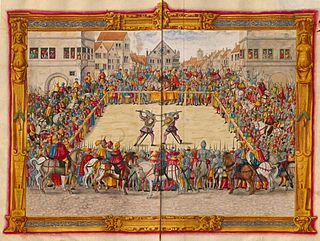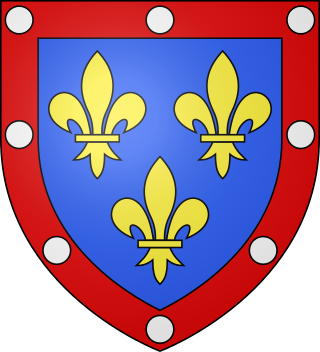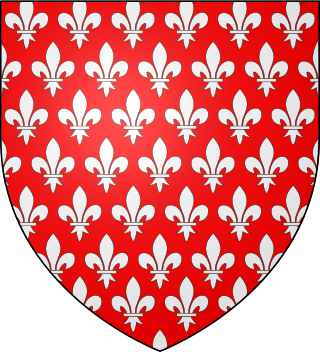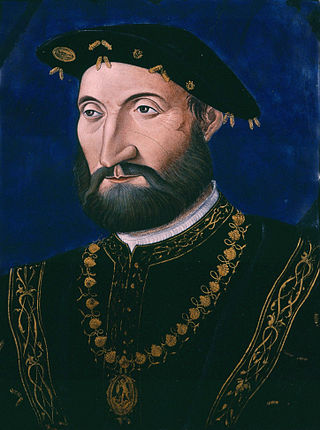
A duel is an arranged engagement in combat between two people with matched weapons.

Trial by combat was a method of Germanic law to settle accusations in the absence of witnesses or a confession in which two parties in dispute fought in single combat; the winner of the fight was proclaimed to be right. In essence, it was a judicially sanctioned duel. It remained in use throughout the European Middle Ages, gradually disappearing in the course of the 16th century.

Trial by ordeal was an ancient judicial practice by which the guilt or innocence of the accused was determined by subjecting them to a painful, or at least an unpleasant, usually dangerous experience. In medieval Europe, like trial by combat, trial by ordeal, such as cruentation, was sometimes considered a "judgement of God" : a procedure based on the premise that God would help the innocent by performing a miracle on their behalf. The practice has much earlier roots, attested to as far back as the Code of Hammurabi and the Code of Ur-Nammu.
The presumption of innocence is a legal principle that every person accused of any crime is considered innocent until proven guilty. Under the presumption of innocence, the legal burden of proof is thus on the prosecution, which must present compelling evidence to the trier of fact. If the prosecution does not prove the charges true, then the person is acquitted of the charges. The prosecution must in most cases prove that the accused is guilty beyond a reasonable doubt. If reasonable doubt remains, the accused must be acquitted. The opposite system is a presumption of guilt.

Robert of Alençon (1344–1377), Count of Perche, was the son of Charles II of Alençon and Maria de La Cerda y Lara.

Peter II of Alençon, called The Noble, was Count of Alençon from 1361 and Count of Perche from 1377. He was the son of Charles II of Alençon and Maria de la Cerda.
Eric Jager is an American literary critic and a specialist in medieval literature. He is a professor in the department of English at University of California, Los Angeles, received his B.A. from Calvin College in 1979, and his Ph.D. from the University of Michigan in 1987. He has also taught at Columbia University as an associate professor.

The Château de Saint-Germain-en-Laye is a former royal palace in the commune of Saint-Germain-en-Laye, in the département of Yvelines, about 19 km west of Paris, France. Today, it houses the musée d'Archéologie nationale.

Sir Jean de Carrouges IV was a French knight who governed estates in Normandy as a vassal of Count Pierre d'Alençon and who served under Admiral Jean de Vienne in several campaigns against the Kingdom of England. He became famous in medieval France for fighting in one of the last judicial duels permitted by the French king and the Parlement of Paris. The combat was decreed in 1386 to contest charges of rape Carrouges had brought against his neighbour and erstwhile friend Jacques Le Gris on behalf of his wife Marguerite. Carrouges won the duel. It was attended by much of the highest French nobility of the time led by King Charles VI and his family, including a number of royal dukes. It was also attended by thousands of ordinary Parisians and in the ensuing decades was chronicled by such notable medieval historians as Jean Froissart, Jean Juvénal des Ursins, and Jean de Waurin.

Sir Jacques le Gris was a French squire and knight who gained fame and infamy, and was ultimately killed when he engaged in one of the last judicial duels permitted by the Parlement of Paris after he was accused of rape by Marguerite de Carrouges, the wife of his neighbour and rival, Sir Jean de Carrouges. Carrouges brought legal proceedings against Le Gris before King Charles VI who, after hearing the evidence, authorised a trial by combat to determine the question. The duel attracted thousands of spectators and has been discussed by many notable French writers, from the contemporary Jean Froissart to Voltaire.

Aunou-le-Faucon is a commune in the Orne department in northwestern France.

The Château de Carrouges is a château, dating partly from the 14th century, located in the commune of Carrouges, in the Orne department, Normandy, northern France. It is unusual in its combination of an austere fortress with a comfortable residence. The original fortifications at Carrouges were besieged and destroyed by English forces during the Hundred Years War. After the war, the château was rebuilt by Jean Blosset, grand seneschal of Normandy, in the 15th century.

The Priory of Saint-Martin-des-Champs was an influential monastery established in what is now the city of Paris, France. Its surviving buildings are considered treasures of Medieval architecture in the city.

The Last Duel is a 2021 epic historical action drama film directed by Ridley Scott from a screenplay by Nicole Holofcener, Ben Affleck, and Matt Damon, based on the 2004 book The Last Duel: A True Story of Crime, Scandal, and Trial by Combat in Medieval France by Eric Jager. Set in medieval France, the film stars Damon as Jean de Carrouges, a knight who challenges his former friend, squire Jacques le Gris, to a judicial duel after Jean's wife, Marguerite, accuses Jacques of raping her. The events leading up to the duel are divided into three distinct chapters, reflecting the contradictory perspectives of the three main characters. Affleck also stars in a supporting role as Count Pierre d'Alençon.
Marguerite de Carrouges was a French noblewoman. She married Jean de Carrouges in 1380.

Guy I de Chabot, seigneur de Jarnac (1514-1584) was a French courtier, soldier and governor. Rising to prominence with the elevation of his family to great office during the reign of François I, Jarnac became entangled with the great factions of court, and a marriage between himself and Louise de Pisseleu, the sister of the king's mistress, secured his centrality at court. That brought him into conflict with those around the dauphin, Henri II, and led to his famous duel with La Châtaignerie at the advent of the new king's reign.

The Last Duel (Original Motion Picture Soundtrack) is the soundtrack to the 2021 film of the same name directed by Ridley Scott. Featuring musical score composed by Harry Gregson-Williams, who previously collaborated with Scott in Kingdom of Heaven (2005) and The Martian (2015), the soundtrack that accompanied 21 tracks from the film's score, released by Hollywood Records on October 15, 2021.













